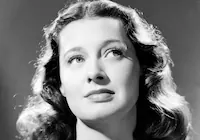French Without Tears
Cast & Crew
Anthony Asquith
Ray Milland
Ellen Drew
Janine Darcey
David Tree
Roland Culver
Film Details
Technical Specs

Synopsis
The residents of Professor Maingot's French school for English gentlemen are agog when beautiful Diana Lake comes to visit her younger brother. The only man unaffected by her beauty is Alan Howard, who is disdainful of her flirtations. Alan's indifference prompts Diana to flirt with Chris Neilan, who falls in love with her. When hardhearted naval commander Bill Rogers enters the school, Diana sets her sights on him and dates both men. She two times them until they discover that she has been feeding them the same lines, and instead of coming to blows, the men become friends and reject Diana. This leaves Chris free to renew his romance with Jacqueline, Professor Maingot's daughter, while Diana makes it clear that she is really in love with Alan. Afraid that he will succumb to Diana's charms, Alan arranges to leave for London immediately. Despite the efforts of Bill and Chris, Alan never makes it to London, and reluctantly falls in love with Diana.

Director

Anthony Asquith
Cast

Ray Milland

Ellen Drew
Janine Darcey
David Tree

Roland Culver
Guy Middleton
Kenneth Morgan
Margaret Yarde
Toni Gable
Jim Gerald
Mantovani And His Orchestra
Stella Roberts
The Peters Sisters
Crew
Teddy Baird
Nikolaus Brodsky
Ian Dalrymple
A. Degrunwald
Alex Fisher
Jack Hildyard
Bernard Knowles
Theo Lageard
David Lean
David E. Rose
Paul Sheriff
Worth
Mario Zampi

Film Details
Technical Specs

Articles
Ellen Drew, 1914-2003
She was born Esther Loretta "Terry" Ray on November 23, 1914, in Kansas City, Missouri. The daughter of a barber, her family moved to Chicago when she was still an infant and she lived a very quiet childhood far removed from the glamour of Hollywood. She was encouraged by some friends to enter a beauty contest when she was just 17. After winning, she tried her luck in Hollywood, but found that they were no immediate offers for her particular talents.
She eventually took a waitressing job at C.C. Brown's, a famed Hollywood Boulevard soda fountain, and had virtually abandoned her dreams as a starlet when William Demarest, a popular actor's agent and well-known character actor, spotted her. Demarest arranged a screen test for her at Paramount, and she was promptly placed under contract for $50 a week.
For the first few years, (1936-38), Drew got only bit parts, and was often uncredited. When she finally got prominent billing in the Bing Crosby musical Sing You Sinners (1938), she decided to change her name, from Terry Ray to Ellen Drew. She earned her first major role in Frank Lloyd's If I Were King (1938) opposite Ronald Colman, yet for the most part of her career, rarely rose above "B" material and second leads. Still, she had some fine exceptions: Preston Sturges' enchanting comedy Christmas in July (1940), with Dick Powell; Tay Garnett's lighthearted war romp My Favorite Spy (1942) co-starring Kay Kyser; Julien Duvivier's taut The Imposter (1944), holding her own with a brooding Jean Gabin; and Mark Robson's chilling low-budget chiller Isle of the Dead (1945) opposite Boris Karloff. Drew made some notable television appearances in the late '50s including Perry Mason and The Barbara Stanwyck Show, before retiring from the entertainment industry. She is survived by her son David; five grandchildren; and five great-grandchildren.
by Michael T. Toole

Ellen Drew, 1914-2003
Quotes
Trivia
Notes
Although the running time of the U.S. release was 67 minutes, the film ran 86 minutes in its British release. Modern sources credit playwright Terence Rattigan with screenplay, along with Anatole DeGrunwald and Ian Dalrymple. Paramount bought the play in March 1937 for $50,000 and mounted the show on Broadway before filming it. The play opened in New York on September 26, 1937. The onscreen credits read that producer Mario Zampi appears "by arrangement with Two Cities Films Ltd."














